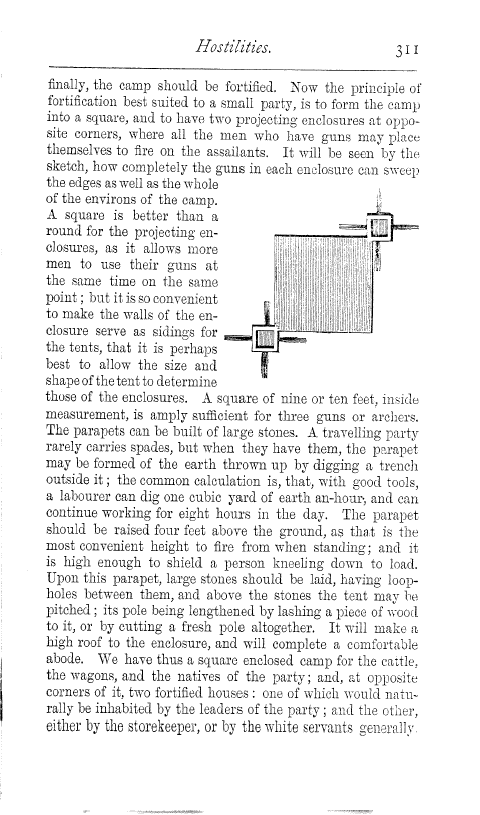Hostilities. 311
finally, the camp should be fortified. Now the principle of fortification best suited to a small party, is to form the camp into a square, and to have two projecting enclosures at opposite corners, where all the men who have guns may place themselves to fire on the assailants. It will be seen by the sketch, how completely the guns in each enclosure can sweep the edges as well as the whole
of the environs of the camp. A square is better than a round for the projecting enclosures, as it allows more men to use their guns at the same time on the same point ; but it is so convenient to make the walls of the enclosure serve as sidings for
the tents, that it is perhaps
up.
best to allow the size and
shape of the tent to determine
those of the enclosures. A square of nine or ten feet, inside measurement, is amply sufficient for three guns or archers. The parapets can be built of large stones. A travelling party rarely carries spades, but when they have them, the parapet may be formed of the earth thrown up by digging a trench outside it ; the common calculation is, that, with good tools, a labourer can dig one cubic yard of earth an-hour., and can continue working for eight hours in the day. The parapet should be raised four feet above the ground, as that is the most convenient height to fire from when standing; and it is high enough to shield a person kneeling down to load. Upon this parapet, large stones should be laid, having loopholes between them, and above the stones the tent may he pitched ; its pole being lengthened by lashing a piece of wood to it, or by cutting a fresh pole altogether. It will make a high roof to the enclosure, and will complete a comfortable abode. NV e have thus a square enclosed camp for the cattle; the wagons, and the natives of the party; and, at opposite corners of it, two fortified houses : one of which would naturally be inhabited by the leaders of the party ; and the other, either by the storekeeper, or by the white servants generally.

